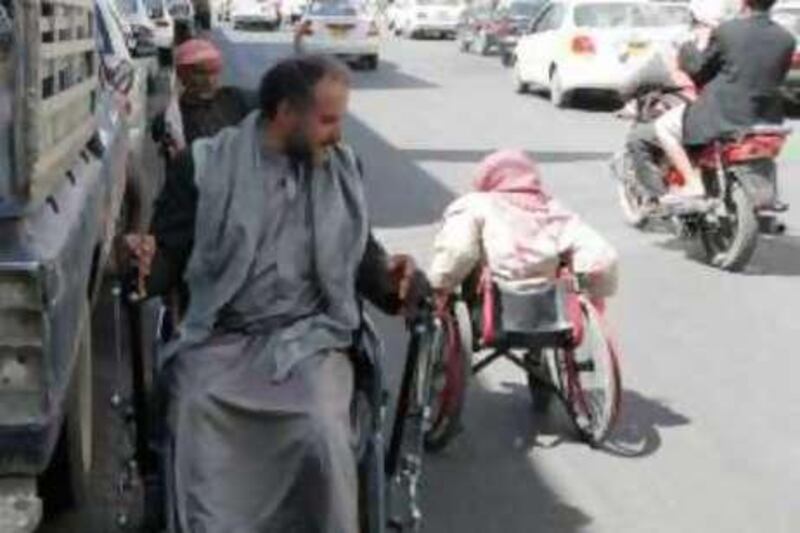SANA'A // For the first 17 years of her life, Samia Mohammed Ali rarely saw the sun or got the chance to make friends because her parents were ashamed of her disability; as a baby she contracted polio, which caused paralysis in both her legs.
"I was born disabled and was locked indoors without being able to go out or talk to people. My parents felt ashamed to show me to the people who usually consider disability something disgraceful. I had no health care, no education and my parents showed an obvious preference to my brothers and sisters," she said. It was through a neighbour that Ms Ali, now 22, heard about the Challenge Society for Physically Disabled Women and the services it provides to Yemeni women with disabilities.
"It was difficult for me to persuade my parents to allow me to join the society because they did not want me to go out. After several attempts, I joined. I started reading and writing classes and now I am in Grade 11. I also learnt painting and dress designing. I now feel human, despite the problems that I still face at home," she said. "When I go to the market with my brother, some people pity me and throw money at me. They think every disabled person walking in the street is a beggar. This annoys me a lot for I want them to treat me equally," Ms Ali said. Taxi drivers also do not stop for her as they do not want the hassle of taking someone in a wheelchair.
There are no accurate figures for the number of disabled people in Yemen, or on their demographic breakdown, but the government has estimated that there were about 380,000 in 2004, a figure rights groups say is grossly underestimated. In a conservative society such as Yemen, where women have few rights, being physically disabled is doubly difficult, said Jamalah al Baidani, the Challenge Society director. "People look at disabled women as useless and a heavy burden on their family. Some families force their disabled daughters to beg, or sell wheelchairs or hearing aids to other disabled people; some even take the money their children earn."
Ms Baidani said lack of awareness is the main reason why society is so intolerant of people with disabilities and that removing the social stigma would take a greater contribution from the government and media. "The role of the media in raising public awareness about the rights of disabled people is still limited. Such awareness programmes are vital to address social malice against the disabled, but they are costly and our priority is supporting the people in our society."
Over the past few years, the government has tried to take greater steps to resolve the difficulties faced by people with disabilities. Two weeks ago, parliament ratified the UN Convention on the Rights of Persons with Disabilities, which is meant to end discrimination against the physically and mentally disabled. Rights campaigners have applauded the move, which they said would allow them to seek better rights for the disabled, including education and accessible buildings.
"The convention provides for improving public awareness about the rights of disabled and so we will use this to push for more awareness campaigns in the countryside on education for the disabled; we will also push for a higher employment rate," said Ali al Wajeh, head of the Salam Centre for Physically Disabled Care. In 2002, the government passed a law that guaranteed five per cent of jobs in the public sector to people with disabilities. But Salah Ayoub Tarish, the head of the Physically Disabled Care and Rehabilitation Society in Taiz, 270km south of Sana'a, said employment agencies created obstacles and extra conditions that made it harder for disabled applicants. Mr Tarish said that out of 47 posts assigned to the disabled in Taiz, only 28 people had been taken on and all the others were rejected, mostly by the health ministry.
Abdulnaser al Kabab, the health ministry director, argued that the applicants did not fit the agency's requirements. However, even if society is more tolerant, and the disabled are ensured greater rights to employment and education, they still face the challenge of getting to school or work, or even travelling around. "Roads and buildings are not designed with ramps, toilets and other facilities to meet our needs as disabled people. Schools and universities are not designed to accommodate disabled people," said Ms Baidani, who uses a wheelchair. "This does makes difficult to integrate the disabled in the society."
Because of this, the centre has opened a primary school so that there are no obvious obstacles for young girls to attend classes. Ms Baidani said illiteracy among disabled women could be as high as between 87 per cent to 90 per cent. The centre helps 750 disabled women, 70 of whom live at the centre because they have been abandoned by their families. The most common causes of physical disabilities are traffic accidents, inter-family marriages, tribal feuds, land mines and firearms, spinal fever, genetic diseases and malnutrition.
Amin al Kamali, who heads the pan-Arab Neurosurgeons' Society, said with better surgeons the number of disabilities caused by spinal cord injuries could be reduced. "We have also recommended that folic acid should be made available at a low price so that poor, pregnant women can get it easily. It will reduce congenital and physical disability by 50 per cent," he said. The Disabled Fund, set up in 2003 by the government to provide assistance to the disabled, now helps 135,000 people and has distributed 8,000 wheelchairs, said Abdullah al Hamdani, the fund's executive director.
Some people have complained about the long process when applying for support, such as having to travel to the capital to receive a wheelchair. malqadhi@thenational.ae





